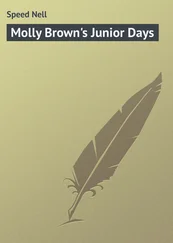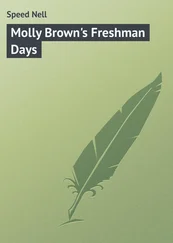Nell Speed - Molly Brown of Kentucky
Здесь есть возможность читать онлайн «Nell Speed - Molly Brown of Kentucky» — ознакомительный отрывок электронной книги совершенно бесплатно, а после прочтения отрывка купить полную версию. В некоторых случаях можно слушать аудио, скачать через торрент в формате fb2 и присутствует краткое содержание. Жанр: foreign_prose, на английском языке. Описание произведения, (предисловие) а так же отзывы посетителей доступны на портале библиотеки ЛибКат.
- Название:Molly Brown of Kentucky
- Автор:
- Жанр:
- Год:неизвестен
- ISBN:нет данных
- Рейтинг книги:4 / 5. Голосов: 1
-
Избранное:Добавить в избранное
- Отзывы:
-
Ваша оценка:
- 80
- 1
- 2
- 3
- 4
- 5
Molly Brown of Kentucky: краткое содержание, описание и аннотация
Предлагаем к чтению аннотацию, описание, краткое содержание или предисловие (зависит от того, что написал сам автор книги «Molly Brown of Kentucky»). Если вы не нашли необходимую информацию о книге — напишите в комментариях, мы постараемся отыскать её.
Molly Brown of Kentucky — читать онлайн ознакомительный отрывок
Ниже представлен текст книги, разбитый по страницам. Система сохранения места последней прочитанной страницы, позволяет с удобством читать онлайн бесплатно книгу «Molly Brown of Kentucky», без необходимости каждый раз заново искать на чём Вы остановились. Поставьте закладку, и сможете в любой момент перейти на страницу, на которой закончили чтение.
Интервал:
Закладка:
“You not get in Heaven!” exclaimed Kent. “Why, Aunt Mary, there wouldn’t be any Heaven for all of us bad Brown boys if you weren’t there.”
“Well, now them is words of comfort what beats the preacher’s. I done always been b’lievin’ in ’fluence an’ I mought er knowed my white folks would look arfter me on the las’ day jes as much as ever. I kin git in as Miss Milly’s cook if’n th’aint no other way. I been a ’lowing whin I gits ter Heaven I wouldn’t have ter work no more, but sence I been a laid up in the baid so long I gin ter think that work would tas’e right sweet. Cookin’ in Heaven wouldn’t be so hard with plenty of ’gredients ter han’ and no scrimpin’ and scrougin’ of ’terials. A lan’ flowin’ with milk an’ honey mus’ have aigs an’ butter. Here you, Sukey Jourdan! Whar you hidin’?”
“Here I is, Sis Ma’y, I jes’ stepped in the shed room ter men’ the fire ginst ’twas time ter knock up a bite er dinner fer you.”
“Well, while I’s a thinkin’ of it, I want you to git my bes’ linen apron outn the chist – the one with the insertioning let in ’bove the hem, an’ put it in the highboy drawer with my bes’ black silk. I low I’ll be laid out in a apron, ’cause if’n I can’t git inter Heaven no other way, I am a thinkin’ with a clean white apron on I kin slip in as a good cook.”
“Dear Aunt Mary, you have been as good as gold all your life,” declared Mrs. Brown, wiping a tear from her eye, but smiling in spite of herself at Aunt Mary’s quaint idea of a way to gain an entrance through the pearly gates.
Aunt Mary had had many doubts about her being saved and had spent many weary nights, terrified at the thought of dying and perhaps not being fit for Heaven, but now that she had thought of wearing the apron, all doubts of her desirability were set at rest; indeed, her last days were filled with peace since she felt now that even Peter could not turn back a good cook.
“I must be going, Aunt Mary,” said Kent, taking the old woman’s withered hand in his strong grasp. “I’ll be home again in a few weeks, I fancy, maybe sooner.”
“They’s one thing I ain’t arsked you yit: whar’s that there Judy gal? I been a dreamin’ you would bring her back with you.”
“She is the thing I am going back to France for, Aunt Mary.”
“Sho nuf? Well, well! They do tell me they’s fightin’ goin’ on in some er them furren parts. Sholy Miss Judy ain’t nigh the fightin’ an’ fussin’?”
“Yes, I am afraid she is. That’s the reason I must go for her.”
“Oh, Kent son! Don’t you git into no scrap yo’sef. It’s moughty hard fer young folks ter look on at a scrap ’thout gittin’ mixed up in it. Don’t you git too clost, whin you is lookin’, either. Them what looks on sometimes gits the deepes’ razor cuts with the back han’ licks. You pick up that gal an’ bring her back ter you’ maw jes’ as fas’ as yo’ legs kin carry you.”
“I’ll try to,” laughed Kent.
“Don’t try! Jes’ do it! That there Judy gal is sho nice an’ ’ristocratic, considerin’ she ain’t never had no home. She done tell me whin she was here to little Miss Milly’s weddin’ that she an’ her folks ain’t never lived in nothin’ but rented houses. That’s moughty queer to me, but ’cose niggers don’t understan’ ev’y thing. Well, you tell her that ole Mary Morton say she better pick up an’ come back to Chatswuth.”
“I certainly will, Aunt Mary, and good-by!”
The old woman put her hand on his bowed head for a moment, and while she said nothing, Kent took it for a benediction.
CHAPTER IV.
AFTERNOON TEA
Molly had established the custom of afternoon tea in her orchard home, and while she had been greatly teased by her brothers for introducing this English custom into Kentucky country life, they one and all turned up on her porch for tea if they were in the neighborhood.
“It is one place where a fellow can always find some talk and a place to air his views,” declared John, as he reached for another slice of bread and butter. “It isn’t the food so much as the being gathered together.”
“Well, you are gathering a good deal of food together in spite of your contempt for it,” put in Paul. “That’s the sixth slice! I have kept tab on you.”
“Why not? I always think plain bread and butter is about the best thing there is.”
“Yes, why not?” asked Molly, calling her little cook Kizzie to prepare another plate of the desirable article. “Aunt Clay, you had better change your mind and have some tea and bread and butter.”
Mrs. Sarah Clay had driven over in state from her home when she heard Kent had arrived. She wanted to hear the latest news, also to tender her advice as to what he was to do now. She presented the same uncompromising front as of yore, although her back had given way somewhat to the weight of years. Judy Kean always said she had a hard face and a soft figure. This soft figure she poured into tight basques, evidently determined to try to make it live up to her face.
“Tea!” she exclaimed indignantly. “I never eat between meals.”
“But this is a meal, in a way,” said Molly hospitably bent, as was her wont, on feeding people.
“A meal! Whoever heard of tea and bread and butter comprising a meal?” and the stern aunt stalked to the end of the porch where the baby lay in her basket, kicking her pink heels in the air in an ecstasy of joy over being in the world.
“Molly, this baby has on too few clothes. What can you be thinking of, having the child barefooted and nothing on but this muslin slip over her arms? She is positively blue with cold.”
Molly flew to her darling but found her glowing and warm. “Why, Aunt Clay, only feel her hands and feet! She is as warm as toast. The doctor cautioned me against wrapping her up too much. He says little babies are much warmer than we are.”
“Well, have your own way! Of course, although I am older than your mother, I know nothing at all.”
“But, Aunt Clay – ”
“Never mind!”
Poor Molly! She could never do or say anything to suit her Aunt Clay. She looked regretfully at the old lady’s indignant back as she left her and joined Kent, who was sitting on a settle with his mother, holding her hand, both of them very quiet amidst the chatter around the tea table. They made room for their relative, who immediately began her catechism of Kent.
“Why did you not come home sooner?”
“Because I had some work to do, sketches illustrating an article on French country houses.”
“Humph! Did you get paid for them?”
“Yes, Aunt Clay!”
“Now, what are your plans?”
“I have landed a job in New York with a firm of architects, that is, I had landed it, but I am not so sure now since – ”
“Good! You feel that you had better stay at home and look after Chatsworth.”
“Oh, no! I am sure I could not be much of a farmer.”
“Could not because you would not! If I were your mother, I would insist on one of you staying at home and running the place.”
“Ernest is thinking of coming back, giving up engineering and trying intensive farming on Chatsworth.”
“Ernest, indeed! And why should he have wasted all these years in some other profession if he means to farm?”
“Well, you see,” said Kent very patiently because of the pressure he felt from his mother’s gentle hand, “farming takes money and there wasn’t any money. Ernest always did want to farm, but it was necessary for him to make some money first. Now he has saved and invested and has something to put in the land, and he is devoutly hoping to get out more than he puts in.”
Читать дальшеИнтервал:
Закладка:
Похожие книги на «Molly Brown of Kentucky»
Представляем Вашему вниманию похожие книги на «Molly Brown of Kentucky» списком для выбора. Мы отобрали схожую по названию и смыслу литературу в надежде предоставить читателям больше вариантов отыскать новые, интересные, ещё непрочитанные произведения.
Обсуждение, отзывы о книге «Molly Brown of Kentucky» и просто собственные мнения читателей. Оставьте ваши комментарии, напишите, что Вы думаете о произведении, его смысле или главных героях. Укажите что конкретно понравилось, а что нет, и почему Вы так считаете.












